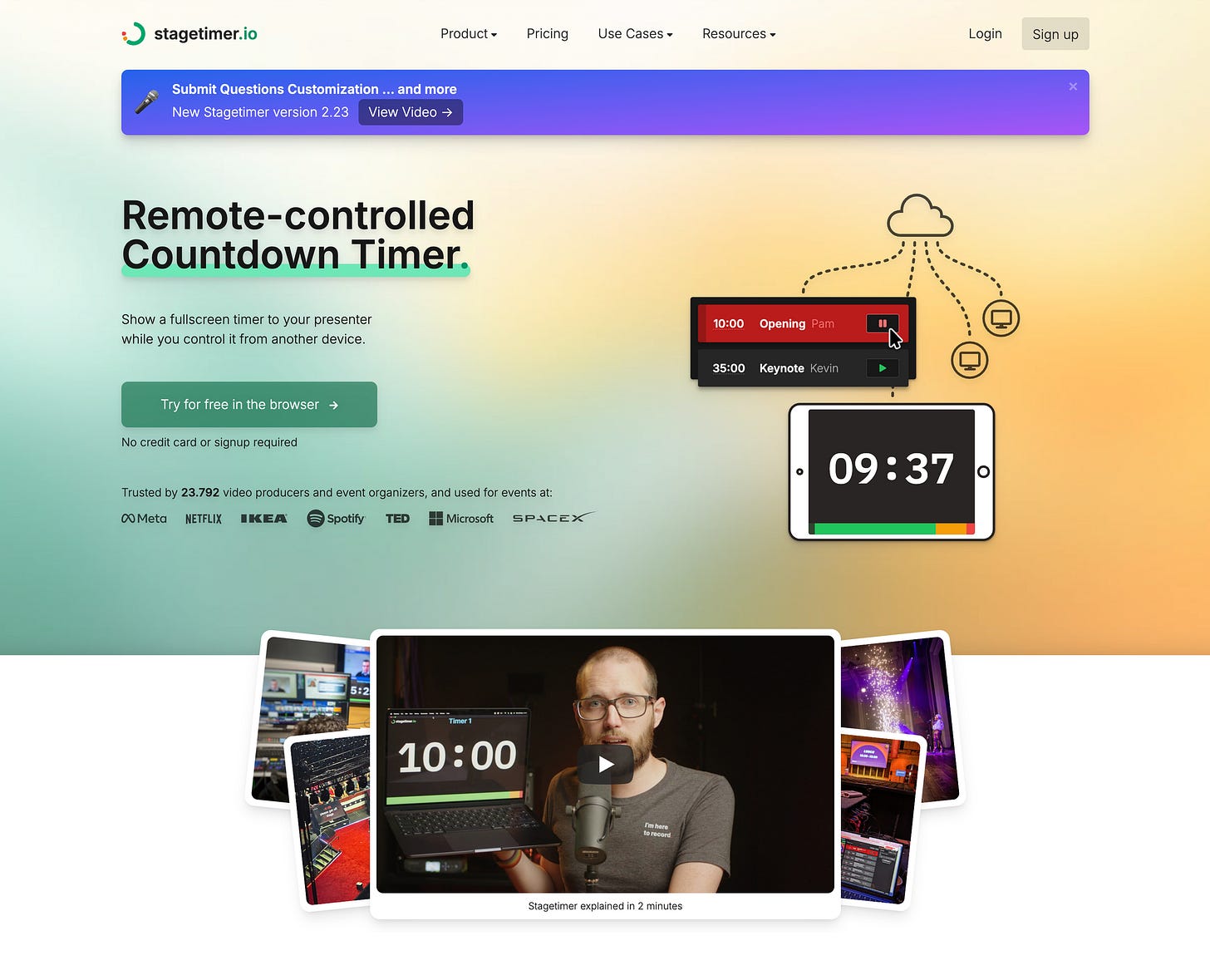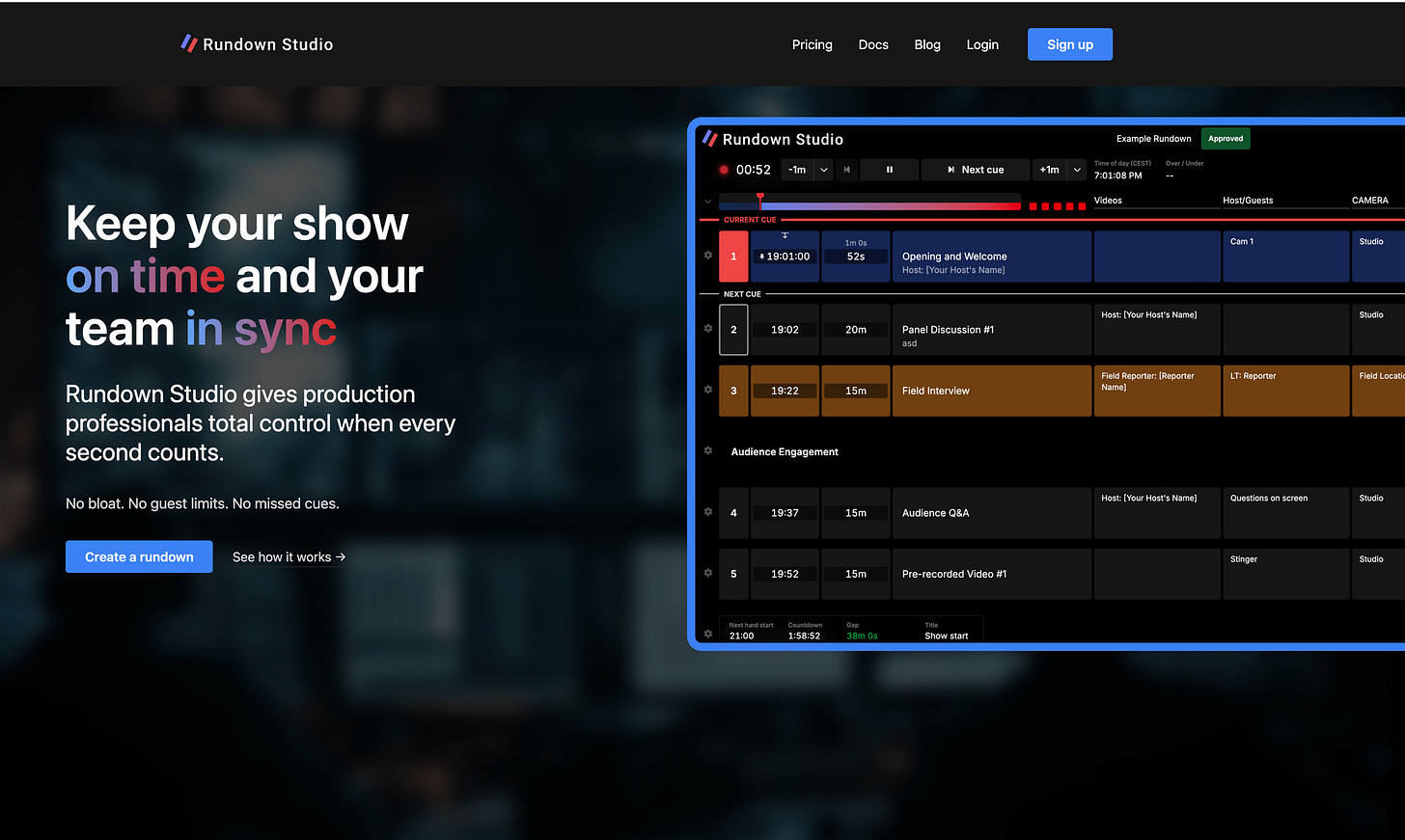stagetimer.io Doubles to 20k MRR: Lukas' Learnings on AI, Employees, and Sales
Volume #28 of "Happy Bootstrapping" Newsletter
Lukas Hermann has doubled stagetimer.io from 10k to 20k MRR in two years. After failed employee experiments, he’s back working with his wife – and Claude Code. With his second product Rundown Studio, he’s testing co-founding. An honest report on growth pains, rejected exit offers, and German founder bureaucracy.
This is a summary of Episode 139 of the “Happy Bootstrapping” Podcast (German).
The Evolution: From Employees Back to Duo
“I told myself, like every business, if you want to grow bigger, you need more employees,” Lukas recalls his logic from two years ago. But after six months with a Polish developer, he pulled the plug: “I had to write everything down in principle. That slowed me down so much.”
The problem: As a solo founder, he suddenly had to document every thought. “After this adjustment period, I was faster doing it alone myself.” Today he uses Claude Code as a “junior developer”: “As soon as I write, this and that needs to be different, it changes immediately.”
The Business Model: Churn Reduced from 12% to 3%
stagetimer shows speakers at events their remaining time. What sounds simple is now used by 2,000 paying customers – from SpaceX to universities for exams.
The biggest insight: “This monthly subscription, many buy it for one month and cancel it right away.” The solution was counterintuitive – they built the cancel directly into the pricing. Instead of monthly subscriptions, there are now one-time licenses for events. Churn dropped from 12% to under 3%.
Surprising customers: Universities from France and Australia use stagetimer for exam times. “We would have never said universities need our app. Never!”
Marketing and the Failed Sales Strategy
The growth channels remain classic:
60% of traffic comes via SEO
Product-led growth through logo in free version
Newsletter to 500 opt-in subscribers
30% referral rate in the video producer network
What didn’t work: YouTube advertising (”zero conversion”) and cold outreach. For the referral program, Lukas is testing a new approach:
“The person who gets the referral link gets the free month. Not the one who gives it.”
Now he’s working with a branding agency on a sales strategy: “For me, sales is a complete blank slate.”
The Second Leg: Rundown Studio
After a phone call with a frustrated ShoFlo user (”he pays $6,000 per year for it”), Lukas founded Rundown Studio with a Swedish co-founder as second SaaS offering.
“I can transfer a lot of the technical knowledge completely over,” he explains the advantage. Completely new tech stack: Firebase instead of own servers, React instead of Vue.js.
The big difference:
“In the future, I would always found with a co-founder again. It’s so much more relaxed because you can delegate some responsibility.”
Lukas’ Learnings from Seven Years of Bootstrapping:
Hiring employees is hard – “Firing is really hard, totally underestimated”
Claude Code works like a junior developer without HR drama
B2B is better than B2C – “You find really grateful customers”
Pre-founders agreements help with co-founder conflicts
German bureaucracy is manageable – “There are rules to simply start your business”
“€500,000 cash for the product,” Lukas tells about the rejected exit offer. His calculation: After taxes, €300,000 remain – “you buy a one-room apartment in Stuttgart and then it’s gone.” Instead, he uses stagetimer as a “playground” for learning.
What I Found Interesting as an Interviewer
I found Lukas’ pragmatic approach to AI as an employee replacement interesting in this episode – while many are still discussing, he’s using it productively.
The churn solution through one-time licenses sounds counterintuitive at first but is then also an advantage for one’s own psyche. I also liked his honest reflection on failed experiments and that despite doubling MRR, he says:
“I feel like, have I even accomplished anything?”
His mission to encourage German founders shows in almost every sentence – and that’s something we have in common again.
Happy Bootstrapping is a German podcast where I interview bootstrapped founders, indie hackers, and solopreneurs about their startup journeys.
Over the years, I’ve connected with many successful entrepreneurs who have built e-commerce shops, SaaS platforms, mobile apps, content businesses, or hybrid models.
Furthermore I am a bootstrapper myself and growing my DevOps-as-a-Sercice and Web Operations Company “We Manage”.



